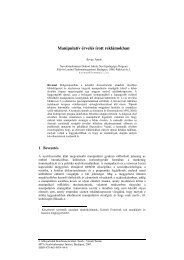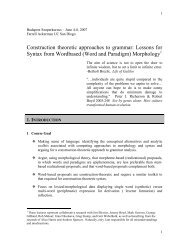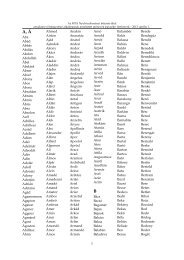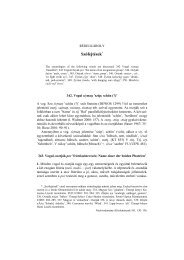Nyelvtudományi közlemények 91. kötet (1990)
Nyelvtudományi közlemények 91. kötet (1990)
Nyelvtudományi közlemények 91. kötet (1990)
Sie wollen auch ein ePaper? Erhöhen Sie die Reichweite Ihrer Titel.
YUMPU macht aus Druck-PDFs automatisch weboptimierte ePaper, die Google liebt.
THE SONORITY HIERARCHY IN HUNGARIAN 141<br />
If (2) were a universal law, there could be no '1' or '2' entries in (6) at<br />
all. However, the high number of exceptional entries is counterbalanced by<br />
the 'low quality' of exceptional words. First, a few interjections, namely pfuj<br />
'phooey, phű 'phew', hm 'id', and hja 'well' are included in (6), because they<br />
were mentioned in the dictionaries (Bakos 1974, Juhász et al. 1982, Országh<br />
1977, Papp 1969) or papers (Abondolo 1984, Kassai 1981, Siptár 1979,1980)<br />
I have included in my corpus. But in a larger corpus it would be possible to<br />
find other interjections, such as grmbh, hmpf or brrr. The onomatopoetic<br />
nature of these expressions makes it hard to exclude any combination<br />
categorically. Theresfore I am inclined to discard these elements: with the<br />
exception of bolyh 'tomentum' which will have no onset counterpart, this<br />
move will increase the symmetry of the system.<br />
Second, certain entries such as nganaszán 'name of Uralic tribe', ptózis<br />
'ptosys', mnemotechnika 'mnemonics, ftálsav 'italic acid', szgraffito, and<br />
perhaphs a few others can hardly (if at all) be pronunced by native speakers<br />
in the manner suggested by the ortography. This is not to say that all<br />
"foreign" words should be eliminated from the corpus (on the contrary, foreign<br />
words tend to fill in the accidental gaps in the system), but surely the<br />
line must be drawn somewhere. The items deemed exceptional above<br />
are likely to manifest exceptional behavior in simple reading and repetition<br />
tasks, while most "learned" or foreign words such as gnóm 'gnome' or pszichológia<br />
'psychology' are likely to pattern with native words. In fact, certain<br />
foreign words, such as szféra 'sphere' are likely to fare better than certain<br />
native words (especially proper names as Szakcs).<br />
Third, the entries in the diagonal reflect the fact that geminate codas<br />
can be found with almost every consonant, but geminate onsets are absent.<br />
Examples are: juss 'share', hossz 'length', muff 'id', épp, 'just', sikk<br />
'fashion', vice 'joke', ott 'there', prices 'bunk', pötty 'dot', pech |hh| 'bad<br />
luck', alább 'below', agg 'old', haddelhadd 'rumpus', meggy 'sour-cherry',<br />
nézz 'look 2nd.sg.imp.indef, könny 'tear', bumm 'boom', toll 'pen', kinn<br />
'out', falj |jj| 'devour 2nd.sg.imp.indef', orr 'nose'. The examples given are<br />
always the 'best' in the sense that proper names are avoided if common<br />
nouns can be found, monomorphemic or at least uninflected words are preferred<br />
to overtly inflected forms, surface forms having the same underlying<br />
representation are preferred to those coming from different URs, and finally<br />
native words are preferred to 'foreign' or 'learned' words. This means that<br />
in any case (e.g. the coda dd) the reader can infer from the given example<br />
(the compound haddelhadd) that no word can be found in its class which<br />
has lesser morphemic complexity but is not uninflected (as e.g. add 'give<br />
2nd.sg.imp.def) or is not a proper name (as e.g. Fadd).<br />
Nyelvtudományi Közlemények <strong>91.</strong> <strong>1990</strong>.



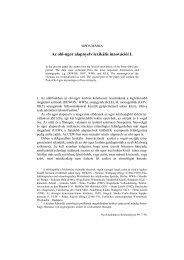
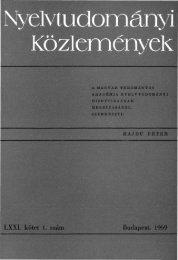
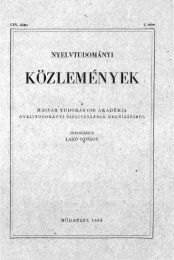
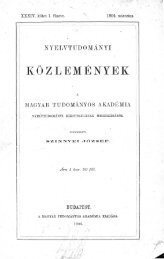
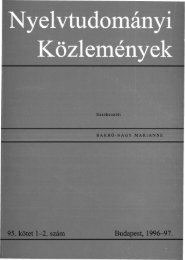
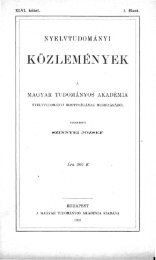
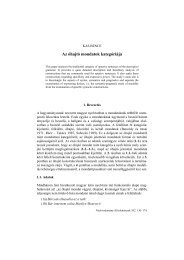
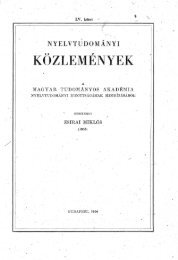
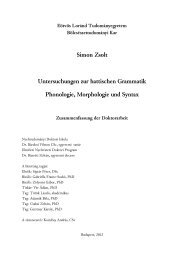
![Gósy Mária: A [p, t, k] mássalhangzók zöngekezdési ideje Bevezetés ...](https://img.yumpu.com/15682849/1/190x245/gosy-maria-a-p-t-k-massalhangzok-zongekezdesi-ideje-bevezetes-.jpg?quality=85)
